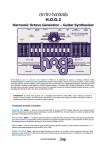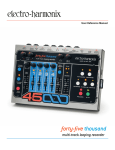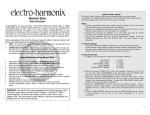Download M-Audio ex-p Operating instructions
Transcript
Harmonic Octave Generator – Guitar Synthesizer EXP. MODE ENVELOPE FILTER DRY OUTPUT INPUT GAIN Operating Instructions Congratulations on your purchase of the HOG! The HOG is an Octave and Harmonic Generator/Guitar Synthesizer that can simultaneously generate multiple octaves and harmonics from your input signal. Whether you play single notes, arpeggios or full chords, the HOG will track every note you play. In addition, the HOG comes with 7 Expression Modes that enable you to modify your sounds using a standard Expression Pedal, a MIDI Controller, or the Expression Button on the HOG itself. We have also included an amplitude Envelope and a 2nd Order low pass Filter with Resonance. You can also purchase the optional EH Foot Controller which will allow you to store and load 6 presets. In this Instruction Manual, we will refer to all of the generated octaves and harmonics as voices. WARNING: Use only the 9VDC/500mA AC adapter supplied with the HOG. Do not use any other AC adapters. Using other AC adapters, even those made by Electro-Harmonix, could cause harm to the unit, the adapter or you. The HOG does not use batteries. Audio Controls INPUT GAIN Slider — Simultaneously controls the level of the input signal before entering the A/D Converter and the level of the output signal after the D/A Converter so that Input and Output are always at the same level. The gain before the A/D Converter increases as the slider is pushed upward. The INPUT GAIN Slider is an analog control and is not saved with the Foot Controller Presets. Ideally, you want to set the INPUT GAIN slider so that you have maximum signal level at the A/D Converter but does not clip the A/D. CLIP LED — When the input signal clips the A/D Converter, the CLIP LED will light up. It is best if this LED lights only occasionally on your loudest notes or not at all. DRY OUTPUT Slider — Controls the output volume of your original, unaffected DRY signal before it exits the HOG. The DRY OUTPUT volume will increase as this slider is pushed upward. This DRY OUTPUT signal bypasses all of the Expression Modes, the Envelope and the Filter. INPUT Jack — Connect your instrument’s 1/4" cable to the HOG by inserting it into the INPUT Jack. The Input Impedance presented at the INPUT Jack is 680 kOhms. DIRECT OUTPUT Jack — This jack outputs a buffered version of the Input signal. Using this jack will NOT put any additional load on your instrument. The output impedance at this jack is 400 ohms. OUTPUT Jack — Connect your amplifier, mixer or computer to this jack using a 1/4" cable. The output impedance at this jack is 400 ohms. STATUS LED — When the STATUS LED is lit, the HOG is in Effect mode. When the STATUS LED is off, the HOG is in Bypass mode. BYPASS Footswitch — Press the BYPASS Footswitch to toggle the HOG between Bypass and Effect modes. When you power up the HOG, it will start up in Bypass mode. If a preset is loaded through the HOG’s Foot Controller and you press the BYPASS Footswitch on the HOG, it will enter Bypass mode. When you press the BYPASS Footswitch again for Effect mode, it will not load the previously loaded preset but will instead load the sound that the sliders are currently set to: What You See Is What You Get. Voice Controls There are 10 Voice sliders on the HOG. Each features a white cap with a black line and controls the Output volume for its assigned Voice. -2 OCTAVE Slider — Controls the output volume of the -2 OCTAVES voice, which is 2 octaves below the original input signal. The -2 OCTAVES signal will be 1/4 the frequency of the input signal. As this slider is pushed upward, the volume of the -2 OCTAVE voice will increase. -1 OCTAVE Slider — Controls the output volume of the -1 OCTAVE voice, which is 1 octave below the original input signal. The -1 OCTAVE signal will be 1/2 the frequency of the input signal. As this slider is pushed upward, the volume of the -1 OCTAVE voice will increase. ORIGINAL Slider — Controls the output volume of the ORIGINAL voice. This voice is your Dry signal; the difference between the ORIGINAL voice and the DRY OUTPUT is that the Original voice goes through the Expression Modes, Envelope and Filter, so it is treated just like all other voices. The volume of the ORIGINAL voice will increase as this slider is pushed upward. +5TH Slider — Controls the output volume of the +5TH voice. The pitch of this voice is a perfect 5th note above the original input note. For example if you play an A note, the HOG will output the first E note above the A. The +5TH signal will be 1.5 times the frequency of the input signal. The volume of the +5TH voice will increase as this slider is pushed upward. +1 OCTAVE Slider — Controls the output volume of the +1 OCTAVE voice, which is 1 octave above the original input signal. The +1 OCTAVE signal will be twice the frequency of the original input signal. As this slider is pushed upward, the volume of the +1 OCTAVE signal will increase. +1 OCTAVE +5TH Slider — Controls the output volume of the +1 OCTAVE +5TH voice. The pitch of this voice is a perfect 5th note above the first octave above the original input note. For example if you play an A note, the HOG will output an E note one octave higher than the +5TH slider's E note. The +1 OCTAVE +5TH signal will be 3 times the frequency of the input signal. The volume of the +1 OCTAVE +5TH voice will increase as this slider is pushed upward. +2 OCTAVES Slider — Controls the output volume of the +2 OCTAVES voice, which is 2 octaves above the original input signal. The +2 OCTAVES signal will be 4 times the frequency of the original input signal. As this slider is pushed upward, the volume of the +2 OCTAVES signal will increase. +2 OCTAVES +3RD Slider — Controls the output volume of the +2 OCTAVES +3RD voice. The pitch of this voice is a major 3rd note above the second octave above the original input note. For example if you play an A note, the HOG will output a C# note over two octaves above the input. The +2 OCTAVES +3RD signal will be 5 times the frequency of the input signal. The volume of the +2 OCTAVES +3RD voice will increase as this slider is pushed upward. +3 OCTAVES Slider — Controls the output volume of the +3 OCTAVES voice, which is 3 octaves above the original input signal. The +3 OCTAVES signal will be 8 times the frequency of the original input signal. As this slider is pushed upward, the volume of the +3 OCTAVES signal will increase. +4 OCTAVES Slider — Controls the output volume of the +4 OCTAVES voice, which is 4 octaves above the original input signal. The +4 OCTAVES signal will be 16 times the frequency of the original input signal. As this slider is pushed upward, the volume of the +4 OCTAVES signal will increase. SPECTRAL GATE Button and LED — When the SPECTRAL GATE LED is lit, the Spectral Gate function is active and in the signal path. Press the SPECTRAL GATE Button to toggle this function On/Off. The Spectral Gate emphasizes the loudest frequency or harmonic and reduces the volumes of all other present frequencies and harmonics. Use the Spectral Gate to produce new interesting sounds at the touch of a button. Envelope and Filter Controls ENVELOPE LOWER & UPPER Sliders — The Envelope sliders control the amplitude Attack or Decay of the Voices. The LOWER slider controls the lower 5 voices (-2 Octaves to +1 Octave); the UPPER slider controls the upper 5 voices (+1 Octave +5th to +4 Octaves). The Envelope sliders have a center-detent; they click into place at the center of their travel. When set to the center-detent, there is no change to the voices’ envelope: you have an instantaneous Attack and an infinite Decay. As you push the sliders up from the center, the rate of Decay increases until the notes are barely audible. As you push the slider down from the center, the rate of Attack increases so that your notes slowly fade-in. ENVELOPE ON LED — Indicates when the Envelope section is in or out of the signal path. When the LED is lit, the Envelope is On and in the signal path, when the LED is off, the Envelope is bypassed. ENVELOPE Footswitch — Toggles the Envelope section ON / OFF. FILTER FREQUENCY Slider — Controls the cutoff or peak frequency of the Low Pass Filter. As the FREQUENCY slider is pushed upward, the cutoff frequency of the filter rises. This is a 2nd-Order filter. FILTER RESONANCE Slider — Controls the Q or peak of the Filter. As the RESONANCE slider is pushed upward, the filter emphasizes the cutoff Frequency more, creating an audible peak at the setting of the FREQUENCY slider. All of the generated voices go through the Filter at all times. If you do not want to hear the effects of the filter, move the FREQUENCY slider to its top position and the RESONANCE slider down to its bottom position. Expression Controls EXP. MODE Switch and LEDs — The HOG has 7 different Expression modes, this switch consecutively selects a mode, starting with BEND 1 OCTAVE and ending with FILTER and then back to the BEND 1 OCTAVE setting. Each Expression Mode has it own LED which lights up when the mode is selected. The 7 Expression Mode LEDs form a semi-circle around the EXPRESSION MODE Switch. EXP. REVERSE Switch and LED — This switch reverses the direction of the Expression Mode currently selected. For example with the EXP. REVERSE LED off, in BEND 1 OCTAVE mode, as you move the expression pedal from toe up to toe down, the pitch of the voices will continuously rise until you hit 1 octave above. If you hit the EXP. REVERSE Switch and its LED lights up, as you move from toe up to toe down, the pitch of the voices will continuously fall until you hit 1 octave below. EXP. BUTTON Footswitch — This momentary footswitch enables you to take advantage of the 7 Expression Modes without needing an Expression Pedal. Pushing down on the EXP. BUTTON is equivalent to the toe down position of the Expression Pedal. Taking your foot off of the EXP. BUTTON is equivalent to the toe up position of the Expression Pedal. The 7 Expression Modes are as follows (all descriptions assume you are using an Expression Pedal): BEND 1 OCTAVE — Continuously bends all of the generated voices up to 1 Octave UP (or DOWN with EXP. REVERSE LED ON). This is similar to using the whammy bar on a guitar or pitch bend wheel on a synthesizer. You can use this effect to obtain intervals that are between the original note, the perfect 5th and the octave, for example, you can set the expression pedal to obtain a major 6th interval. BEND 1 STEP — Continuously bends all of the generated voices up to 1 Step UP (or DOWN with EXP. REVERSE LED ON). Same effect as BEND 1 OCTAVE except the range is limited to just 1 step or the major 2nd interval. You can bend from an A note to a B note. VOLUME — Continuously varies the volume of the generated voices. As you move the pedal from toe up to toe down, the volume will increase from 0 to 100% (or 100% to 0 with EXP. REVERSE LED ON). FREEZE + GLISS — The Freeze + Gliss function is a new expression mode that works a little differently from the other modes. When the toe is up, you can play your instrument normally. When the toe is down, the HOG will freeze whatever notes you were playing at the time of pushing the Expression pedal down. You can then play over these notes. In between toe up and toe down, the HOG will slide to the new note you play, from the previous note you played. The speed of the glissando is determined by the position of the Expression pedal, the closer the Expression pedal is to toe down, the slower the slide speed will be. For example, if you play an A note and then move the Expression Pedal down to 50%, it will freeze the A note. If you then play an E note, the HOG will slide up to the E note. This function is similar to portamento on a synthesizer. Freeze + Gliss is a very tricky mode, it takes some time to master it. It can be frustrating at first but once you get it, it will open new doors to how you play guitar. Please note: Moving the Expression Pedal to the toe up position erases the frozen note in memory. FREEZE + VOLUME — Uses the Freeze function described in the Freeze + Gliss section but instead of Glissando, the Expression Pedal will act like a Volume control for the Freeze function. The further down you push the Expression pedal, the louder the frozen notes will be. When the Expression Pedal is in the Toe-Up position, you will not hear the octaves or harmonics. Please note: Moving the Expression Pedal to the toe up position erases the frozen note in memory. WAH WAH — Turn your HOG into a wah wah pedal. All of the voices will go through a wah filter that you can modulate with the Expression pedal. The Filter’s Frequency and Resonance sliders are inactive in this mode. FILTER — Continuously varies the FREQUENCY slider of the Filter. The toe up position is equivalent to the Frequency slider set to 0. The toe down position will equal the current setting of the FREQUENCY slider. To sweep through the entire range of the filter with your Expression pedal, set the FREQUENCY slider to 100%. Don't forget to also adjust the RESONANCE slider when in this mode, as it will have a dramatic effect on the sound of the filter sweep. External Control Inputs EXP. PEDAL Jack — Plug the Expression Pedal into this jack. The Expression Pedal should have a Tip-Ring-Sleeve plug attached to it. It is important that the Expression Pedal have the correct polarity. The tip of the plug must be connected to the wiper of the potentiometer inside the Expression Pedal. If you are not sure what type of Expression Pedal to use, try to purchase one with a polarity switch, so that it will work with many different types of instruments. Some suggested Expression Pedals: Moog EP1, M-Audio EX-P or Roland EV-5. MIDI IN — You can modulate any of the Expression Modes using MIDI Pitch Bend. Connect the MIDI OUT of your keyboard, computer or other MIDI device to the HOG's MIDI IN jack. Now move the Pitch Bend wheel or set up your computer to output the MIDI Pitch Bend command. If the HOG is set to BEND 1 OCTAVE, you will hear the HOG bending notes the same way you do on a keyboard. Foot Controller and Presets If you plug the HOG’s external Foot Controller into the FOOTSWITCH phone jack, you will be able to store and load 6 presets. Use a normal guitar cable to connect the Foot Controller to the HOG. Except for the INPUT GAIN slider, all sliders and settings on the HOG are saved in the presets, including the position of the Expression Pedal, Exp. Button or MIDI Pitch Bend Wheel. FOOTSWITCH Jack — Plug the HOG's Foot Controller into this jack using a standard 1/4" instrument cable. Storing Presets — Set up a sound you like on the HOG. Then choose a preset button on the Foot Controller. Hold down the preset button, its LED will blink for 3 seconds. When it stops blinking, release the footswitch, your preset has been stored. Loading Presets — Tap a preset button on the Foot Controller once, the HOG will load the preset associated with that Footswitch. When you load a preset that has an Expression Pedal value other than 0 or Toe-Up, it will load the Expression Pedal’s setting. In this case, when the preset is loaded, the corresponding Expression Mode LED will blink rapidly, this tells you there is a pre-loaded Expression Setting. If you want to reset the Expression Setting, press the EXP. BUTTON or press the EXP. MODE Switch, the LED blinking will stop. Please note: If an Expression Pedal is plugged into the HOG while loading a preset, the Preset’s Expression Setting will not load. Bypassing Presets — Pressing any of the Preset Footswitches on the Foot Controller will toggle the HOG between loading the selected preset and Bypass mode. Warranty Information Please complete and return the enclosed warranty card within 10 days of purchase. We will repair the unit for free within one year of date of purchase. If you should need to return your unit for service within the warranty period, please include a brief description of the problem as well as your name, address, telephone number, copy of your receipt, and a check or money order for $5.00 shipping and handling to: Electro-Harmonix 32-33 47th Avenue Long Island City, NY 11101 Att: Service Department Please make checks/money orders payable to New Sensor Corporation. To hear demos by rock stars on all EH pedals visit us on the web at www.ehx.com. Email us at [email protected]












